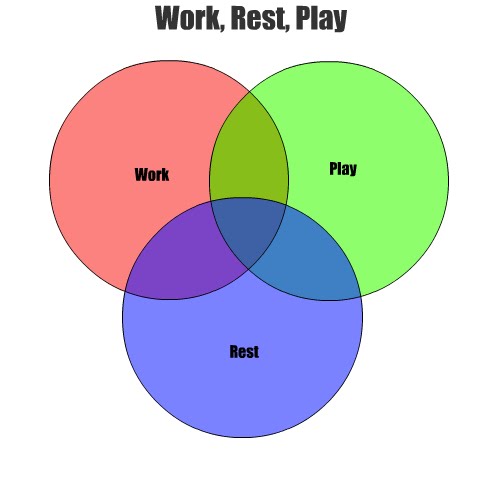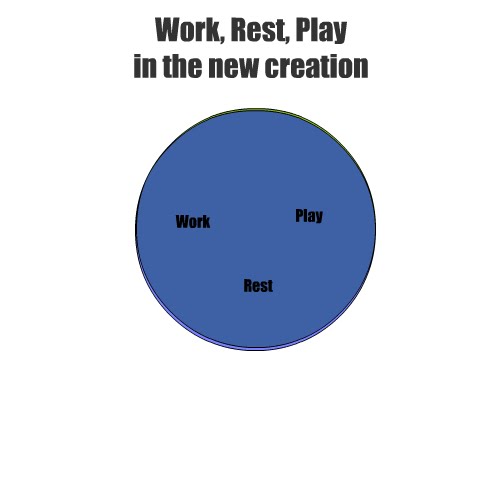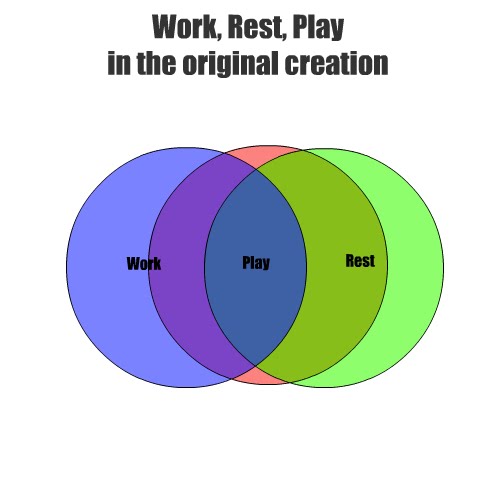This was a sermon preached at City South Presbyterian in 2024. You can listen to the podcast here, or watch it on video. Some of the block quotes were on screen and summarised but have been included in full.

What does your regular week look like?
What are the things you do week in, week out — regular commitments — that are shaping you?
For many of us it will be work, or studying, and some exercise — then some church stuff — church on Sundays, growth group mid-week — your calendar is probably already full — and if you throw kids and their weekly commitments it is overfull.
We have been thinking about inhabiting space; now we are exploring time; learning to number our days; making them count — redeeming the time — so we might live wisely.
The end goal is to construct a rule of life; a pattern of habits to adopt to be formed as followers of Jesus — so we are considering how we are ruled by regular life.
How is your regular week shaping you?
And what regular commitments could you embrace to become more like Jesus?
We cannot make time for everything; we are limited — busy — and this idea of adding more regular stuff — it feels — overwhelming…
We have spent time earlier in 2024 thinking about hospitality and Luke’s Gospel; the idea the kingdom of God is revealed at the table — how do we make time for that? And about living before the throne of God as those raised and seated with Jesus — spending time “in heaven” in prayer and worship? So we can live heaven-on-earth lives — we might want to do this regularly.
But… something has probably got to give if we are going to make time for this stuff…
As we think about the shape of our weeks now — seven days — about our limits; our busyness; how overwhelmed we are — I am going to suggest we should carve out time each week for this stuff, and there is a ready-made category for this in the Bible.
The Bible’s story is the reason we have a seven-day week — our rhythms come from the Genesis story, where God creates and generates for six days, then rests on day seven; naming it holy time; a bit like the garden is marked out as holy space (Genesis 2:2-3) — this becomes the regular rhythm of the week for God’s people in the form of Sabbath (Exodus 20:8-10).
Now. I have preached on Sabbath before — but — I am still not sure I am nailing it as a practice in my own life. And if you know anything about Presbyterians, you will know we have got a tradition of being legalistic about the Old Testament law; a bit keen to apply Israel’s laws to Christians — maybe especially on the Sabbath; which we call the Lord’s Day…
This is not just a Presbyterian thing — my mum’s family were part Methodist, part Anglican and there were all sorts of rules about whether you could watch football on the Sabbath — because you certainly could not play it — and — anyway — my family are reactionaries, so when we moved to Queensland in the late 90s, my dad was asked to MC this annual Presbyterian event called a Celebration Rally; it was on the Lord’s Day — a Sunday night — and at this Celebration Rally there was a sausage sizzle; apparently it was OK for people to cook sausages for hundreds of people on the Lord’s Day, but they ran out — and people were hungry — and rather than breaking bread and fish and passing them around the crowd, dad dared to suggest anyone hungry should grab some drive-through Maccas on the way home — a Lord’s Day tradition in our family… And he caused a mini scandal. Trading on the Lord’s Day is a no-no.
This is the heritage I bring to thinking about the Sabbath — which is mostly “it is a restrictive rule from the Old Testament that does not apply to Christians…”
But.
I am increasingly convinced that I have had it wrong — that the Sabbath is not about restriction — but liberation — that rest is not an imposition but a necessary act of both re-creation and resistance to the patterns of the world we find ourselves surrounded by… that maybe we have reacted against legalism — rightly — but robbed ourselves of a rhythm of refreshment; a habit of time — of coming to Jesus as weary and burdened people and receiving rest (Matthew 11:28-29) — seeing the Sabbath as a practice of grace, not law — learning the way of Jesus as we come alongside him; the Lord of the Sabbath (Matthew 12:7-8).
I am on this journey — and today I want to make the case that our week should be shaped around a regular practice of Sabbath — holy time; time marked out to spend in God’s presence, receiving his gifts — enjoying him and his creation — not just as recreation but as re-creation — not as a legalistic restriction but liberation from a machine world that wants to desacrate time and space and our bodies — make those things less sacred — while we should be learning to see time and space and our bodies as connected to the divine life in whom we live and breathe and have our being.
So we will cover the Sabbath in the Old Testament pretty quickly — we have already seen how the Genesis story sets up the Sabbath as holy time, that reflects God enjoying his creation and inviting people into holy space and time with him —
it also emerges against the contrasting backdrop of Egypt in the Exodus story; Israel’s life without rest; their slavery — their oppression — at the hands of Pharaoh and his slave drivers — where they are an oppressed group of migrants doing back-breaking labour while being treated ruthlessly (Exodus 1:11-14).
They are enslaved by a slave-driving kingdom that gives no rest. The Exodus is their rescue out of this kingdom and into God’s kingdom, and this experience defines their ethical system; their law; their regular weeks — see how the Ten Commandments are framed in the Exodus story: “I am the Lord your God who brought you out of slavery” (Exodus 20:1-2).
And when you get to the structure of the week — they are called to keep this day that God declared holy in the beginning holy; to do all their work in those six days, and then enjoy a Sabbath — to God — doing no work; it is a rest day — a holy day given to enjoying God’s rest (Exodus 20:8-10).
And this is for everyone — it is an anti-Egypt — Sabbath includes whole households; including servants — anyone employed or enslaved — and any foreigners — the migrant workforce of their day — it is a day tasting liberation for all. At this point it is tied back to the creation story, to God’s words in Genesis (Exodus 20:11), but as the law expands from the Ten Commandments, Moses says do not oppress foreigners because you know what it was like to be oppressed — their experience of oppression; of work without rest is meant to shape how they live — this regular Sabbath expands from week to year — every seven years (Exodus 23:9-11) — Leviticus calls this a Sabbath year — where they — and all those in their household — and the foreigner — are to live off the land; off God’s provision; rather than their own work; resting the land — and every seventh seven-year period they would have this Jubilee year (Leviticus 25:4-6).
This Sabbath day though — it is to give rest and refreshment to all — including the slave and the foreigner — now — this stuff about slavery amongst God’s people is tricky — but, briefly, I reckon the whole point of Sabbath is that it is meant to shape how you see the people you rest with the way God sees them — and see work differently too — it is a teaching thing (Exodus 23:13). When Moses restates the law in Deuteronomy as Israel is about to enter the land, we get the Ten Commandments again, and the Sabbath command again, with two tweaks — the Sabbath is so everyone — including those who might be oppressed — can rest; and rather than looking to Genesis, the Sabbath is tied to their liberation; the Exodus; their rescue and re-creation — that they were slaves with no rest, so they are not to enslave with no rest (Deuteronomy 5:13-15).
The Sabbath is meant to show them they are not slaves, and teach them not to be slave drivers; to be like the Egyptians.
But once they get in the land they are just like their neighbours; they get obsessed with acquiring wealth; they do not practice the Sabbath year; the prophet Amos says they trample the needy and have done away with the poor — and they spend their Sabbaths daydreaming, waiting to get back to trade; they are dreaming of cheating others out of their wealth, enslaving the poor… buying them with silver or a pair of shoes (Amos 8:4-6)…
The prophet Isaiah launches his condemnation of Israel by announcing their celebration of Sabbath has become worthless to God; because their hands are full of blood; they are not seeking justice or defending the oppressed (Isaiah 1:13-17). Instead, Isaiah lists out their rebellion — explaining why God is not seeing their fasting and holy days as they are facing exile (Isaiah 58:1-3) — because — on the day of their fasting they are not just not defending the oppressed; they are oppressors — they are regularly exploiting their workers; fighting each other (Isaiah 58:3-4); their religiosity is the opposite of what God wants; he wants them to fast from oppression and injustice and set people free, not enslave them.
They should be fasting from hoarding, by sharing their food with the hungry; sheltering the poor; clothing them; spending themselves on behalf of the hungry; satisfying the needs of the oppressed (Isaiah 58:6-10). That is what God would notice; if they do this, then God will guide them to life; they will be like a well-watered garden (Isaiah 58:11) — a people of paradise — Isaiah turns from fasting to Sabbath; he says if they keep from breaking the Sabbath — doing as they please — treating holy time as holy and a delight — not going their own way, but God’s — then they will find joy in the Lord.
This is what the Sabbath is meant to be and produce, then God will bring them into his heavenly feast (Isaiah 58:13-14) — that they have become oppressors; slave drivers means exile; these promises need fulfilment; an Israel who understand the Sabbath, who delight in God and rest in him; enjoying him; practicing justice and love; modelling this new way of living in time.
And we find this fulfilment; this true Israelite in the one who invites the weary and burdened — those overwhelmed by life under the oppressive rule of other powers — in other kingdoms — to come to him — not to buy them for a pair of shoes, and oppress them more — he is not violent and proud, he is gentle and humble, and he offers to give rest (Matthew 11:28-29).
He does not come with a heavy yoke of slavery, but an invitation to come beside him and receive rest, to learn to rest; so that we find rest for our souls — Sabbath rest with our creator, who invites us into his Exodus, the fulfilment of Isaiah — paradise and a feast. Matthew follows these words with a picture of two visions of Sabbath — a miserly legalism, and the enjoyment of God’s provision — I reckon we have often tossed both in order to avoid oppressive legalism. Jesus feeds his disciples on the Sabbath — they are tasting a sort of Jubilee year; picking from the field — but the Pharisees — well — they have never seen Jubilee, so they just see work — rule-breaking — they want the hungry to stay hungry (Matthew 12:1-2). Jesus condemns them for missing the point of God’s law; his heart — and condemns the innocent — missing that the king of rest — the Lord of the Sabbath — is in front of them modelling fulfilment of the law (Matthew 12:7-8).
And then, as another image of the contrast, we meet this man with a shrivelled hand — and the Pharisees do not see a human; they see a test for Jesus; they want this guy to stay unable to work… excluded… poor… to prove a point. But Jesus declares it is lawful to do good on the Sabbath; and he heals the guy — he brings life — complete restoration — while the Pharisees — well, they are happy to plot a murder on the Sabbath (Matthew 12:10-14).
Later the one who has an easy yoke and light burden says these Pharisees load up heavy, cumbersome burdens on people’s shoulders and do nothing to ease the burden (Matthew 23:4). They oppress. They enslave. They walk like the Egyptians. So what does this all mean for us as we seek to follow the Lord of the Sabbath?
What are we to do with this way of shaping our week?
The miserly legalism of the Pharisees has no appeal to me at all — but maybe it is not a choice between working to eat, or to do good, and legalistic rest… but between coming to Jesus for rest, or being team Pharisee.
Maybe the Sabbath is not meant to oppress, but to liberate; maybe it is a chance to follow a different rhythm; to live differently in time as we come to the Lord of the Sabbath and receive rest; the fruits of the new life of God’s people promised in the prophet Isaiah — whose writings Jesus fulfils.
Jesus is the one who does away with the yoke of oppression; replacing it with a yoke that is light; giving on behalf of the hungry — liberating the oppressed — bringing people into garden-like rest.
Jesus is the one who delights in God’s Sabbath; the king of Sabbath — and brings people to feast at God’s table. Jesus is the one who, on the cross — launches a new Exodus; liberating humanity from sin and death and Satan and from life under oppressive rule into life where he shoulders our burdens — telling the rebel there with him “today you will be with me in paradise” (Luke 23:43) — a promise for us as well, as those raised and seated with him now — so that our Sabbath rest is not just shaped by God as creator, or by Israel’s Exodus rescue, but our own — so, in the same way, the practice of Sabbath is a chance for us to learn from Jesus, and, like for Israel, a chance for us to not oppress others; to give rest to others as we embrace the pattern of the kingdom.
Sabbath is a chance not to be a slave or a slave driver; to not live like Egypt, or embrace the patterns of our world, but to delight in God’s goodness; to taste paradise today.
The rest the king of rest invites us into is the garden; not just to look back to Eden, and not just to look forward to paradise, but to remember we are in paradise with him today; it is a day to shape ourselves to live as heaven-on-earth people as we work the other six.
In the Practicing the Way resources on Sabbath — it is one of the practices they suggest might become part of your rule of life — they break down how to think about Sabbath not as a legalistic restriction but as this way of life with four headings — Stop. Rest. Delight. Worship.
Stop working and participating in the systems we live in that are inevitably violent and oppressive; disconnect from the grind; not just reluctantly, like in Amos — where we are plotting and scheming how to game that system. Resting from our work; and trusting that God provides what we need and will keep the world ticking over even when our shoulder is not pushed against the wheel.
And as we do this we are invited to use this time we have carved out to delight in God; his goodness to us in our rescue and in creation; enjoying abundance; anticipating paradise — feasting, practicing hospitality — enjoying one another as we live as the household of God — and worshipping God together; spending time “dwelling in the heavenlies” as part of the rest Jesus has entered into that he invites us into as those united with him.
The issue with that Celebration Rally was not so much that my dad suggested people go to Maccas — it was in the lack of abundance at the heart of the celebration — that was a picture of a certain sort of miserliness. The Lord’s Day is a chance to join the leisure of the garden — to play in anticipation of the new creation; to taste and see that God is good; to feast — and to do this as both the culmination of each week and a practice that shapes our week… to plan and prepare ahead of time in order to experience fulfilment and contentment in God’s generosity that remind us we do not need that Sabbath experience every day; as we work; a rhythm that is deliberate and focused on receiving God’s goodness that keeps us from chasing that same satisfaction from idols…
And… here is a surprising reason to embrace the Sabbath that I like — grounded in the prophets and the life of Jesus — and not just in “what is good for me personally” — Sabbath is political; Sabbath is an act of resistance — a liberating practice for us — and for others — we are not just celebrating not being slaves; it is where we learn not to be slave drivers.
This comes with a challenge as we build our own practices; seeking to enjoy abundance in this sanctuary in time — it is to hear the words of Amos, and step out of consuming others — actively, or in our daydreaming about our own little kingdoms… to refuse to act like an Egyptian slave driver, relying on the exploited labour of foreign workers to deliver for us — and, instead, to make space and time for these very folks to enjoy liberating rest — and this practice is meant to shape the rest of our week too.
You might not notice, but we participate in systems of oppression — particularly the oppression of migrant labour, or foreign labourers — we are not slave drivers… but maybe we enslave drivers.
I wonder how many of you have ordered food using Uber Eats, rather than cooking yourself… what about ordering from Amazon?
There are plenty of other forms of modern slavery embedded in our supply chains… but Amazon has got a track record of exploiting its workers — this story from the Guardian is about delivery drivers so desperate to stick to their delivery schedule — which is so tightly monitored drivers cannot take bathroom breaks…
“I saw no effort on Amazon’s part to push delivery service providers to allow their drivers to use the restroom on a normal human basis, leading many, myself included, to urinate inside bottles for fear of slowing down our delivery rates… ”
Many of them will use bottles in their cars. In Australia, Amazon has gamed the employment regulations so they can overload drivers’ schedules and erode safety practices; by calling drivers “hobbyists” or contractors.
“Serious safety issues like dangerous overloading and pressuring drivers to rush through deliveries is not something to brush off as insignificant, implying that this gruelling work is little more than a paying hobby with drivers in full control.”
People caught up in this system talk about being treated like robots rather than humans.
“I feel dehumanized. I feel like they resent the fact that I am not a robot and that I am made of flesh and bone.”
Enslaved; dehumanised to deliver according to quotas — like Israelite slaves making bricks in Egypt — not just set by their corporate overlords, but the consumer expectations of the market…
Deliberately not consuming on the Sabbath is a chance to lift our eyes so we are not swept up in making money, or planning how we might buy a person for a pair of shoes… to make time to see the way our consumption impacts migrant workers, or the poor.
One of the coolest things I read on Sabbath comes from Tricia Hersey — who gets called the Nap Bishop — she wrote this book Rest Is Resistance — where she argues that the conditions of the modern market were actually born in slavery; in the plantations that built the wealth of the west; and where our bodies — especially those of marginalised and oppressed people — when we are working in a system that celebrates 24/7 productivity and rewards hustle and always being on — what we see in the spirit of Amazon — we are still working under Egyptian conditions; brainwashed by a violent culture that does not see us as humans but as machines — she reckons that is at work across the economy — where we work, and where others work for us — and we will not see it unless we carve out time to notice. She sees naps — resting — Sabbath — as acts of resistance against a world that always wants more from you — liberation; a path back to our true nature.
“ …this violent culture that wants to see us working 24 hours a day, that does not view us as a human being but instead views our divine bodies as a machine… The Rest Is Resistance movement is a connection and a path back to our true nature. ”
Sabbath is a chance to deliberately step out of other kingdoms that claim our time, and our bodies, and reorient ourselves to the kingdom of the king of rest; as we come to him, and receive rest — because it is a path back to being human; as we stop and rest and delight and worship — maybe we would find life in a weekly rhythm of Sabbath, not just on that one day, but in a way that will shape our work on the other six days; as we experience freedom from the patterns of sin and slavery and slave driving so we find rest for our souls; learning life with him in paradise.



